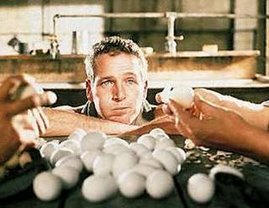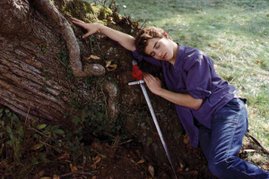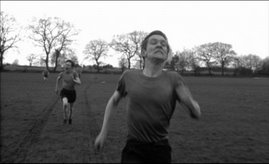 31e Festival de Rotterdam
31e Festival de RotterdamEntrevue avec Takashi Miike
2002
Paru dans le journal Daily Tiger de Rotterdam
When you were working on television, has the production pace served you later for directing your feature films?
I was working as an assistant director on several TV commercial series and even if there were different directors, mass production, the creative pitch and look were always the same, a situation that frustrated me at the time, so that is the main reason why I rather chose to direct films, even with low budget and no money, at least I could make my own creative work.
But in The Happiness of K, is there any stylization of TV series?
Well, of course, you can say that, since the characters in the film are not the usual to the ones in most of my films, and are closer to the normal people that you see in regular TV shows. You can say indeed that it’s a parody of orthodox… But in any societies, there are always people who will be out of the framework, and those are the one that interests me.
You have personally a pretty active life; are you following a tight schedule or do improvisation in your work or life?
Well it really depends on the circumstances, for example, now I already have three productions lined-up, so for the next 5 months, I have a schedule in place, but sometimes, something suddenly happens, such as the actors’ availability, which is the most difficult thing about production planning.
Does it explain you presence in Agitator?
The original idea was to have a special guest who would only be on the set for a single day. But then, just the day before the shooting, we were informed that the actor was delayed on another production, that’s why I ended up doing myself the role, which I really enjoyed, because being in front of the camera gave me another perspective of the set.
How to you relate to such a violent character?
Of course a scene like that is very difficult to achieve as you must have a really good communication with your partners and the coordination with the cameraman, and its almost a reverse responsibility since the character who inflict the violence must be the most considerate about the receiver. If you overdoing it, the scene will fail.
What do you think of the Occidental festivals craze about Asian cinema since the last ten years, specially genre films?
There may be some aspects in Asian films who have changed or been improved in recent years but the scene has been alive and productive many years before the western ‘flavour of the month’ interest in what we are doing, but once that hype will subsites, some of us will remain and others will disappear, but it will really depends on the viewer’s reception to the films and the festival programmers as well, but that is of course outside our will.
As we are living in very ironic times, do you still think that excessive violence and twisted humour are the most relevant tools in art today to express views about social contradictions and modern moralities?
I don’t feel that I teach anything about how people should act or what they have to think, I just want to make the films the way I want and almost naturally, issues will come to the surface such as social problems as well, but I really don’t want the audience to feel a certain way, everybody should make up his own opinion and interpret the material the way they like.
Having worked on both genre (Agitator) and auteur (Visitor Q) films, which one remain the most rewarding for you (or are they just the same)?
I don’t think that my films exists separately, they are connected one way or another and I’m always looking to make my next project completely different from the previous one, to explore as many directions as possible, especially inside my own paste.
In Visitor Q, you’re defining a new familial hierarchy despite age or rank who is missing a sense of unity, while in The Happiness of the Katakuris, it is rather the events that shape the family’s togetherness. Do you think there is a bright future for traditional family?
The reality in Japan these days is that family units are much smaller than before, very few families have still their grandparents living under their roofs, and also the number of children is decreasing and the average is 1.7 per family. I’m not saying that this is right or wrong, it may be ok, but it is true that sometimes people just think that it is easier to get away from their parents and that distance helps to live peacefully because they are not seeing each other all the time, but a lot of them doesn’t notice that during that process they lose others things and values and it’s many years later that they start recognizing that their unity is damaged and it may be too late to regain wealthy family relationships.
After directing expensive movies such as the Dead or Alive trilogy, you made the low-budget Visitor Q, which is not a common practice among established filmmakers. Why is it so?
First of all, you must understand that what you call big budget films in America is not on the same scale to us, you have to consider Japanese standards, it is not much money at all, but still, if you do make a film with major funding, you always to have in mind that you must a return of investment and you are more or less obligated to make something that many people can enjoy, and ultimately you feel unfree about that market awareness, and that is the main reason why I wanted afterwards to direct a much smaller project and being free to do whatever I want, since investors don’t invest big bucks, you don’t have to make a lot of money with it. Almost ironically, it is interesting to see that those films are often more successful and reach broader audiences.
© 2007 Charles-Stéphane Roy







